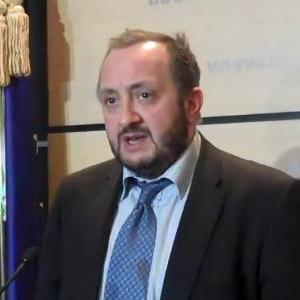Giorgi Margvelashvili facts for kids
Quick facts for kids
Giorgi Margvelashvili
|
|
|---|---|
|
გიორგი მარგველაშვილი
|
|
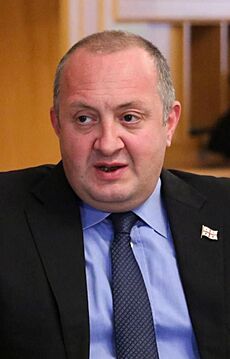
Margvelashvili in 2016
|
|
| 4th President of Georgia | |
| In office 17 November 2013 – 16 December 2018 |
|
| Prime Minister | Bidzina Ivanishvili Irakli Garibashvili Giorgi Kvirikashvili Mamuka Bakhtadze |
| Preceded by | Mikheil Saakashvili |
| Succeeded by | Salome Zourabichvili |
| First Deputy Prime Minister of Georgia | |
| In office 23 January 2013 – 18 July 2013 |
|
| Prime Minister | Bidzina Ivanishvili |
| Preceded by | Irakli Alasania |
| Succeeded by | Giorgi Kvirikashvili |
| Minister of Education and Science | |
| In office 25 October 2012 – 18 July 2013 |
|
| Prime Minister | Bidzina Ivanishvili |
| Preceded by | Khatia Dekanoidze |
| Succeeded by | Tamar Sanikidze |
| Personal details | |
| Born | 4 September 1969 Tbilisi, Georgian SSR, Soviet Union (now Tbilisi, Georgia) |
| Political party | Independent (since 2003) Strong Georgia (since 2024) Georgian Dream (2012-2018) Burjanadze-Democrats (2003) |
| Spouses | Anastasia Virsaladze Khatuna Abashidze Maka Chichua (m. 2014) |
| Children | 3 |
| Alma mater | Tbilisi State University Central European University Georgian National Academy of Sciences |
| Signature |  |
Giorgi Margvelashvili (Georgian: გიორგი მარგველაშვილი; born on September 4, 1969) is a Georgian academic and politician. He served as the fourth President of Georgia from November 17, 2013, to December 16, 2018.
He studied philosophy at university. Before becoming president, he was the head of the Georgian Institute of Public Affairs twice. In October 2012, he became the Minister of Education and Science of Georgia. A few months later, he was also made First Deputy Prime Minister. In May 2013, he was chosen as the presidential candidate for the Georgian Dream political group. He won the election in October 2013 with 62% of the votes.
When Margvelashvili became president, a new constitution started. This new constitution gave less power to the president and more power to the Prime Minister and Parliament. Later, his relationship with the ruling Georgian Dream party became difficult. He was the first president in Georgia's history not to run for a second term.
Contents
Early Life and Education
Giorgi Margvelashvili was born in Tbilisi. His father, Teimuraz Margvelashvili, was an engineer, and his mother, Mzeana Gomelauri, was a psychologist. He graduated from Tbilisi State University in 1992 with a degree in philosophy. He continued his studies at the Central European University in Budapest, Hungary, and the Institute of Philosophy in Georgia. In 1998, he earned his doctorate in philosophy from Tbilisi State University. In the early 1990s, he also worked as a mountain guide.
He joined the National Democratic Institute in Tbilisi in 1995. In 2000, he started working at the Georgian Institute of Public Affairs, which is a school created by Georgia and the United States. Margvelashvili was the head of this institute from 2000 to 2006 and again from 2010 to 2012. Between these times, he led the research department. During these years, he often shared his thoughts on Georgian politics and society.
Political Journey
Before 2012, Giorgi Margvelashvili was not widely known in Georgia. He first got involved in politics briefly in 2003. He joined a political group called Burjanadze-Democrats for the parliamentary election. After the election, there were protests and a change in government during the Rose Revolution. His group then joined another party, and Margvelashvili left politics for a while.
In 2008, he worked with Nino Burjanadze again, joining the advisory board of her research group. By 2012, Margvelashvili was openly critical of the government at the time. He supported the Georgian Dream political group, which was started by Bidzina Ivanishvili. However, he was not directly involved in their election campaign.
Becoming a Government Minister
After the parliamentary election in October 2012, Bidzina Ivanishvili became the Prime Minister of Georgia. Margvelashvili was appointed Minister of Education and Science on October 25, 2012. Ivanishvili described him as "a personal friend" and "an intellectual." In February 2013, Margvelashvili was also made First Deputy Prime Minister.
As minister, Margvelashvili planned several changes to the education system. These included new ways of taking school graduation exams and giving universities more financial freedom. He also announced that the government would provide free textbooks to all 650,000 school students in the country.
Running for President

On May 11, 2013, the Georgian Dream group chose Giorgi Margvelashvili as their candidate for the presidential election in October 2013. The leader, Ivanishvili, said everyone in the group agreed on this choice. Margvelashvili resigned from his government job to avoid any unfair advantages during the election. He campaigned actively, and Ivanishvili often appeared with him to show support.
On October 27, 2013, Margvelashvili won the presidential election. He received 62% of the votes. After winning, Margvelashvili said that making stronger connections with Europe would remain Georgia's main goal. He also stated that the government would work to reduce tensions with Russia.
Serving as President
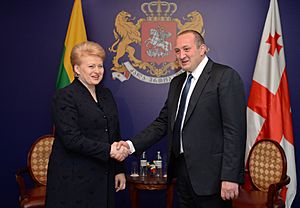
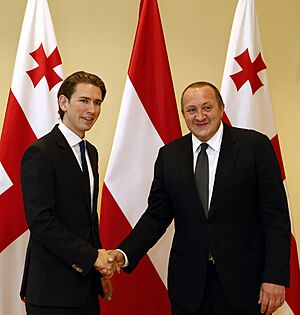
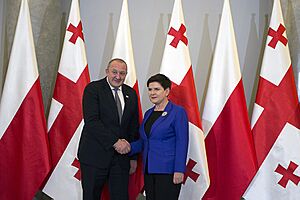
Margvelashvili became the fourth President of Georgia on November 17, 2013. The ceremony took place at the old Parliament building in Tbilisi. With his inauguration, a new constitution came into effect. This new constitution gave much of the president's power to the Prime Minister.
At first, Margvelashvili chose not to move into the large presidential palace built by the previous president. He preferred to work from a smaller office. However, he later started using the palace for official events sometimes.
Working with the Ruling Party
Margvelashvili's relationship with the new Prime Minister, Irakli Garibashvili, was often difficult. When Giorgi Kvirikashvili became prime minister in December 2015, he tried to have a better relationship with the president. However, Margvelashvili remained a figure with different views within the ruling party. He often disagreed with the ruling Georgian Dream party about changes to the constitution. He believed these changes would make the presidency weaker. He also said that the party was not trying to reach agreements with other political groups on these reforms.
When the Georgian Dream party won many seats in the 2016 election, Margvelashvili said it could lead to too much power in one place. However, he also saw it as a chance for important reforms. In October 2017, the parliament approved the constitutional changes. Margvelashvili tried to stop them but eventually signed the law. He said it was hard for him, but he did it for the country's stability. In January 2018, he also tried to stop changes to the law about the Georgian Public Broadcaster. He agreed with private TV stations and groups that the law could harm media freedom in Georgia.
Margvelashvili's term as president ended in December 2018. He did not run for re-election in that year's election. On December 3, 2018, he met with the new President-elect, Salome Zourabichvili. He highlighted this meeting as an example of a peaceful transfer of power in Georgia's history.
Youth Engagement Initiatives
During the 2016 Georgian parliamentary election, President Margvelashvili supported a big project to encourage young people to get involved in elections. This project was started by the Europe-Georgia Institute.
The project, called "Your Voice, Our Future," began in the village of Bazaleti. President Margvelashvili and George Melashvili, the head of the institute, spoke to the participants. After this, summer schools were held in 10 different regions of Georgia. These schools taught young people about civic participation and the importance of voting. Participants visited 20 cities and towns, meeting locals and explaining why voting matters. They also organized creative activities like Flash mobs and plays to get media attention.
After this campaign, the #Initiative Project was created. Its goal was to build a network of active students to promote civic life. Through this project, over 500 activities were funded in more than 20 regions of Georgia. Five summer and winter schools were also organized to help active youth groups across Georgia. This led to a nationwide network of young, active citizens, who now work together on local and national issues.
Support for Minority Rights
During his time as president, Margvelashvili often spoke out in support of minority rights. This included supporting LGBTQ+ rights. For example, after a Georgian football captain, Guram Kashia, wore a pride armband, Margvelashvili wrote on Facebook: "Everyone has the right for freedom of expression. We should respect human rights and liberties."
After the Presidency
In January 2019, Margvelashvili returned to the Georgian Institute of Public Affairs (GIPA). He started teaching courses on politics there. After leaving politics, Margvelashvili and his family mostly live in the town of Dusheti. He rents out a small house near his own to tourists to earn some extra money.
In February 2020, the former Mayor of Tbilisi, Giorgi Ugulava, was sent to prison. Margvelashvili said that Ugulava was a "political prisoner" and that this situation was against democratic rules in Georgia. On February 17, 2020, he announced that he would return to Georgian politics to oppose the Georgian Dream party.
When former Georgian President Mikheil Saakashvili was imprisoned in October 2021, Margvelashvili worked to help free him. Margvelashvili criticized the prison conditions. In September 2024, before the 2024 Georgian parliamentary election, Margvelashvili joined the Strong Georgia political group.
Personal Life
Giorgi Margvelashvili speaks Georgian, English, and Russian. He does not often talk about his private life. He has a daughter named Anna (born 1995) from his first marriage. On September 10, 2014, Margvelashvili married his long-time partner, Maka Chichua (born March 31, 1971), in Dusheti. Maka Chichua used to be a makeup artist and sometimes sang or acted. The couple has two sons: Teimuraz (born February 2, 2015) and Toma (born January 15, 2018). Maka Chichua also has a daughter from a previous relationship, who is Margvelashvili's stepdaughter. In his free time, Margvelashvili enjoys walking, horse-riding, and having friends visit his country house in Dusheti.
See also
 In Spanish: Giorgi Margvelashvili para niños
In Spanish: Giorgi Margvelashvili para niños


